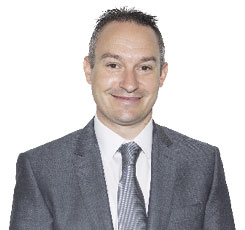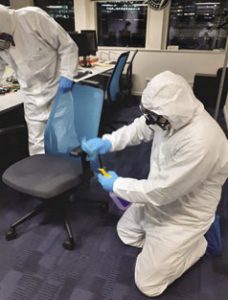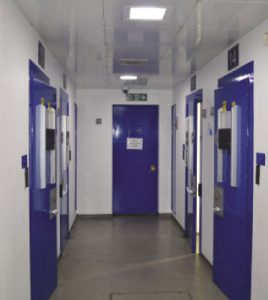 In our latest look at the work of front-line FM staff, we hear how a commercial cleaning team was able to step up cleaning duties on the police frontline during the pandemic
In our latest look at the work of front-line FM staff, we hear how a commercial cleaning team was able to step up cleaning duties on the police frontline during the pandemic
Facilities management within frontline services will always pose unique challenges for commercial cleaners. The teams working for Incentive QAS are responsible for the cleanliness and sanitation of stations across Kent and Essex. Incentive QAS is the contract cleaning arm of the Incentive FM Group, with annual sales in excess of £18.5 million and employing more than 800 staff around the country. The company currently oversees commercial cleaning for police stations in Margate, Canterbury, Folkestone, Maidstone, Tonbridge, Clacton, Colchester, Harlow, Grays, Southend and Basildon.
What was already a high-pressure environment for commercial cleaning teams, became a far more complex task with the spread of COVID-19.
 Incentive QAS Operations Manager, Mark Yull, explains how the teams had to become more agile and demonstrate significant resilience as the environment changed drastically for those carrying out cleaning duties on the frontline.
Incentive QAS Operations Manager, Mark Yull, explains how the teams had to become more agile and demonstrate significant resilience as the environment changed drastically for those carrying out cleaning duties on the frontline.
He said: “Our cleaning operation for the police in Kent and Essex takes place seven days a week and 365 days a year. Our standard service offers daily cleaning in the custody suites and cells, and full reactive cleaning for spaces that demand a quick turnaround. Our teams were familiar with cleaning spaces that had been fouled with bodily fluids and they understood the need to work quickly and in an agile manner in a police van, suite or cell. However, we saw a huge rise in demand for reactive cleaning in the early days of COVID-19 due to the number of arrested individuals suspected of having COVID-19 and potentially infecting the places they had been en-route to the station and obviously within the station itself.”
OUT OF HOURS
Incentive QAS deploy on-site cleaning teams as well as out of hours cleaners for the police. Generally, each custody suite would require one cleaner, but the strain of COVID-19 meant that individual efforts had to be increased to sanitise touchpoints to counteract the movements of detainees with suspected COVID-19. In the space of a few weeks, cleaning routines had to include door handles, switches, balustrades, and any other common touchpoints in the station. As well as a redistribution of resource on the ground, enhanced cleaning equipment and chemicals were also needed to meet the challenge.
 Yull explains how it wasn’t just the stations and suites that caused extra complications during the pandemic. He said: “The problem was the knock-on effect that the virus caused. Police parole staff only have a limited number of vehicles for example, and if someone with suspected COVID-19 (showing symptoms) or someone was coughing inside the vehicle for instance, that vehicle needed to be cleaned. This demanded a quick and agile response. Stock also became an issue. We had plenty of PPE and cleaning equipment, but we found it was becoming increasingly difficult to get hold of. We would order 500 masks but only 100 would turn up. Suppliers enforced limits on orders due to the massive increase of bulk buying. We also found that a lot of PPE and hand gels coming in from Europe didn’t meet the grade required for the job.”
Yull explains how it wasn’t just the stations and suites that caused extra complications during the pandemic. He said: “The problem was the knock-on effect that the virus caused. Police parole staff only have a limited number of vehicles for example, and if someone with suspected COVID-19 (showing symptoms) or someone was coughing inside the vehicle for instance, that vehicle needed to be cleaned. This demanded a quick and agile response. Stock also became an issue. We had plenty of PPE and cleaning equipment, but we found it was becoming increasingly difficult to get hold of. We would order 500 masks but only 100 would turn up. Suppliers enforced limits on orders due to the massive increase of bulk buying. We also found that a lot of PPE and hand gels coming in from Europe didn’t meet the grade required for the job.”
The sector also saw the rise in costs for integral cleaning equipment. Reports showed that items like a box of gloves rose from five pounds to fifteen in a matter of weeks. Incentive QAS have a strong relationship with the police stations they work for and have earned trust through committed and agile cleaning solutions and efforts.
PRISONERS DURING THE PANDEMIC
As the pandemic continued, a structured responsive cleaning routine was embedded by Incentive QAS teams. If a prisoner has or was suspected to have the virus, a rapid and thorough clean of the police vehicle, holding room, and cell would take place.
 Incentive QAS constantly engaged with the NHS guidance, much of which kept evolving to cope with the changing environment. Large amounts of waste including masks and gloves was also deemed hazardous and couldn’t be disposed of through normal channels. Incentive QAS teams worked with the police to source hazardous bins, masks and gloves. With each member of the custody staff, including officers and jailers, expected to wear masks and gloves, the waste operation was also put under new increased pressures.
Incentive QAS constantly engaged with the NHS guidance, much of which kept evolving to cope with the changing environment. Large amounts of waste including masks and gloves was also deemed hazardous and couldn’t be disposed of through normal channels. Incentive QAS teams worked with the police to source hazardous bins, masks and gloves. With each member of the custody staff, including officers and jailers, expected to wear masks and gloves, the waste operation was also put under new increased pressures.
Yull added: “We definitely saw an increased demand for business during COVID-19. From callouts to deep office cleans, it has been a totally different set of expectations for our staff who have reacted tremendously. One of the challenges that may come in the future is if police bosses decide that the need for officers and other police staff to work from a station is less important. If the nature of policing sees less of a demand on the traditional police station set up, we may have to redeploy our teams in other ways.”




